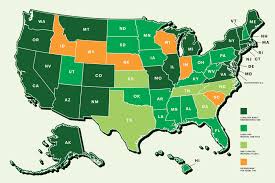States With Legal Weed, In recent years, the landscape of cannabis legislation in the United States has undergone a significant transformation. What was once a predominantly taboo topic is now a mainstream discussion, with a growing number of states embracing the legalization of marijuana. As of 2024, numerous states have implemented various forms of legal weed, ranging from medical to recreational use. This article provides an in-depth look at the states with legal weed and the implications of their policies.
Overview of Legal Weed by State
- California: As one of the pioneers in cannabis legalization, California first allowed medical marijuana in 1996 with Proposition 215. In 2016, the state further expanded its legalization to include recreational use through Proposition 64. Today, California boasts a thriving cannabis industry, with numerous dispensaries and cultivation facilities.
- Colorado: Colorado was a trailblazer in legalizing recreational marijuana when it passed Amendment 64 in 2012. The state’s progressive approach has made it a model for other states considering similar measures. Colorado’s cannabis industry is well-regulated, with strict guidelines for production and sales.
- Oregon: Oregon has been at the forefront of cannabis reform since legalizing medical marijuana in 1998 and recreational use in 2014. The state is known for its comprehensive and relatively liberal cannabis laws, including provisions for home cultivation and a robust legal market.
- Washington: Alongside Colorado, Washington was one of the first states to legalize recreational cannabis, thanks to Initiative 502, which passed in 2012. Washington’s approach includes rigorous quality control and a well-established regulatory framework for cannabis sales.
- Nevada: Nevada legalized medical marijuana in 2000 and took a significant step forward with the legalization of recreational use through Question 2 in 2016. The state’s cannabis industry benefits from a high volume of tourists, contributing to a dynamic market.
- Michigan: Michigan’s path to legalization began with medical marijuana in 2008, followed by the approval of recreational use through Proposal 1 in 2018. The state has developed a structured legal cannabis market, with dispensaries operating across the state.
- Illinois: Illinois made headlines with its comprehensive legalization of recreational marijuana in 2020 through the Cannabis Regulation and Tax Act. The state’s approach includes social equity measures aimed at addressing past injustices related to cannabis prohibition.
- New York: New York’s journey towards cannabis legalization culminated in the passage of the Marijuana Regulation and Taxation Act in 2021. The state is in the process of establishing its regulatory framework and anticipates a robust market for legal cannabis.
- New Jersey: Following the approval of recreational marijuana through a 2020 ballot initiative, New Jersey has been working on implementing its legal cannabis framework. The state’s approach includes provisions for both adult-use and medical cannabis.
- Connecticut: Connecticut legalized recreational marijuana in 2021, following years of medical use legalization. The state is focused on creating a well-regulated market with an emphasis on social equity and community reinvestment.
Implications of Cannabis Legalization
The legalization of cannabis in these states has brought about several notable changes:
- Economic Impact: States with legal weed have experienced significant economic benefits, including job creation, tax revenue, and business opportunities. The cannabis industry has become a substantial contributor to state economies.
- Social Justice: Many states have included provisions for social equity in their legalization frameworks, aiming to address the historical impacts of cannabis prohibition on marginalized communities. These measures often involve expunging past convictions and providing support for minority-owned businesses.
- Regulatory Challenges: Despite the progress, states face ongoing challenges in regulating the cannabis industry. Issues such as quality control, public safety, and balancing state and federal laws remain areas of concern.
- Public Health: The impact of legal cannabis on public health is a topic of ongoing research. States are monitoring the effects of legalization on issues such as substance abuse, mental health, and impaired driving.
Conclusion
The landscape of cannabis legalization in the United States continues to evolve, with more states adopting laws that permit legal weed. Each state has its unique approach to regulation and implementation, reflecting local priorities and concerns. As the legal cannabis market grows, it will be crucial to address the challenges and opportunities that arise, ensuring that the benefits of legalization are maximized while minimizing potential drawbacks.
You Might Also Like These:



